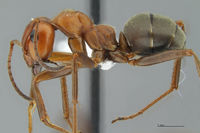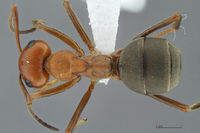Formica prociliata
| Formica prociliata | |
|---|---|

| |
| Scientific classification | |
| Kingdom: | Animalia |
| Phylum: | Arthropoda |
| Class: | Insecta |
| Order: | Hymenoptera |
| Family: | Formicidae |
| Subfamily: | Formicinae |
| Tribe: | Formicini |
| Genus: | Formica |
| Species group: | rufa |
| Species: | F. prociliata |
| Binomial name | |
| Formica prociliata Kennedy & Dennis, 1937 | |
This rare species is known to inhabitant glaciated tallgrass prairies and prairie remnants in Ohio, while the type material was taken from a number of nests in open oak woods on a rocky limestone ridge. At the type locality nests were built under stones on ledges and all lacked thatching, the lack of thatching being an exception to the general rule of thatching in the rufa group. Nests contained multiple queens. Poorly developed trails radiated 15 to 60 m from the nest area. It is likely to be a temporary social parasite of Formica pallidefulva. Colonies from Iowa were found to be fairly populous (Kennedy & Dennis, 1937; Buren, 1944; Creighton, 1950; Coovert, 2005; Ivanov, 2019).
Identification
Creighton (1950): This striking and beautiful species is most easily recognized from the female (queen). The dorsum of the gaster in the virgin female appears greyish because of a rather dense, appressed pubescence. This rubs away in the older females (as do many of the long hairs) leaving the gastric dorsum smooth and shining and revealing the very distinct brown band on each segment.
Coovert (2005): TL 5.5-8.0 mm. Head and mesosoma brownish-orange, slightly darkened dorsally, gaster blackish-brown to nearly black; mandibles and antennae concolorous, legs slightly darker; body with fine covering of appressed micro-pubescence, head and mesosoma moderately dull to weakly satiny (glossier on sides of head), gaster satiny with a distinct grayish cast. This is a smaller species than most other members of the rufa group.
Keys including this Species
Distribution
Latitudinal Distribution Pattern
Latitudinal Range: 44.73° to 33.64606°.
| North Temperate |
North Subtropical |
Tropical | South Subtropical |
South Temperate |
- Source: AntMaps
Distribution based on Regional Taxon Lists
Nearctic Region: United States (type locality).
Distribution based on AntMaps
Distribution based on AntWeb specimens
Check data from AntWeb
Countries Occupied
| Number of countries occupied by this species based on AntWiki Regional Taxon Lists. In general, fewer countries occupied indicates a narrower range, while more countries indicates a more widespread species. |

|
Estimated Abundance
| Relative abundance based on number of AntMaps records per species (this species within the purple bar). Fewer records (to the left) indicates a less abundant/encountered species while more records (to the right) indicates more abundant/encountered species. |

|
Biology
Castes
Male
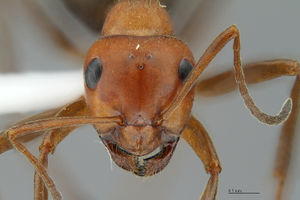  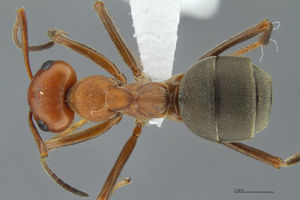 File:Form File:Form
| |
| . | Owned by Museum of Comparative Zoology. |
Images from AntWeb
   
| |
| Paratype of Formica prociliata. Worker. Specimen code casent0103377. Photographer April Nobile, uploaded by California Academy of Sciences. | Owned by USNM, Washington, DC, USA. |
  
| |
| Worker. Specimen code casent0103379. Photographer April Nobile, uploaded by California Academy of Sciences. | Owned by USNM, Washington, DC, USA. |
Queen
Images from AntWeb
    
| |
| Queen (alate/dealate). Specimen code casent0103378. Photographer April Nobile, uploaded by California Academy of Sciences. | Owned by USNM, Washington, DC, USA. |
Male
Images from AntWeb
 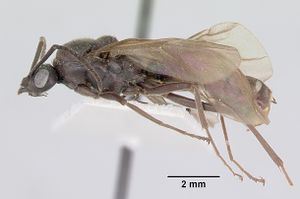  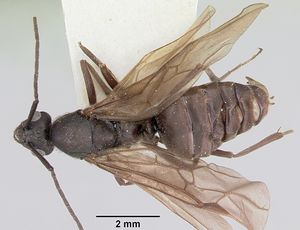 
| |
| Paratype of Formica prociliata. Male (alate). Specimen code casent0103376. Photographer April Nobile, uploaded by California Academy of Sciences. | Owned by USNM, Washington, DC, USA. |
Nomenclature
The following information is derived from Barry Bolton's Online Catalogue of the Ants of the World.
- prociliata. Formica prociliata Kennedy & Dennis, 1937: 531, figs. 1-9 (w.q.m.) U.S.A.
Description
References
- Bolton, B. 1995b. A new general catalogue of the ants of the world. Cambridge, Mass.: Harvard University Press, 504 pp. (page 201, catalogue)
- Buren, W. F. 1944a. A list of Iowa ants. Iowa State Coll. J. Sci. 18: 277-312.
- Coovert, G.A. 2005. The Ants of Ohio (Hymenoptera: Formicidae). Bulletin of the Ohio Biological Survey, New Series 15(2): 1-196.
- Creighton, W. S. 1950a. The ants of North America. Bulletin of the Museum of Comparative Zoology 104: 1-585.
- Ivanov, K. 2019. The ants of Ohio (Hymenoptera, Formicidae): an updated checklist. Journal of Hymenoptera Research 70: 65–87 (doi:10.3897@jhr.70.35207).
- Kennedy, C. H.; Dennis, C. A. 1937. New ants from Ohio and Indiana, Formica prociliata, F. querquetulana, F. postoculata and F. lecontei, (Formicidae: Hymenoptera). Ann. Entomol. Soc. Am. 30: 531-544. (page 531, figs. 1-9 worker, queen, male described)
References based on Global Ant Biodiversity Informatics
- Coovert G. A. 2005. The Ants of Ohio (Hymenoptera: Formicidae). Ohio Biological Survey, Inc. 15(2): 1-207.
- Coovert, G.A. 2005. The Ants of Ohio (Hymenoptera: Formicidae) Ohio Biological Survey Bulletin New Series Volume 15(2):1-196
- Ivanov, K. 2019. The ants of Ohio (Hymenoptera, Formicidae): an updated checklist. Journal of Hymenoptera Research 70: 65–87.
- Trager J. Distributions of Nearctic Formica rufa group species. Personal communication 05 February 2014.
- Wheeler G. C., J. N. Wheeler, and P. B. Kannowski. 1994. Checklist of the ants of Michigan (Hymenoptera: Formicidae). The Great Lakes Entomologist 26(4): 297-310
- Wheeler, G.C., J. Wheeler and P.B. Kannowski. 1994. CHECKLIST OF THE ANTS OF MICHIGAN (HYMENOPTERA: FORMICIDAE). Great Lakes Entomologist 26:1:297-310
